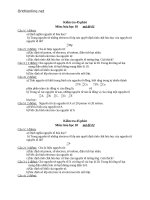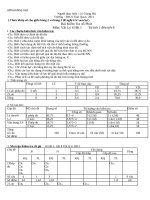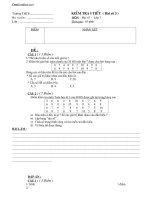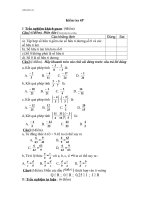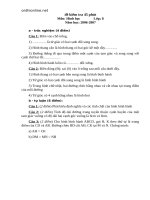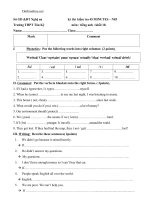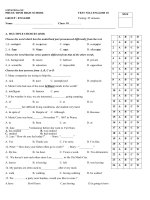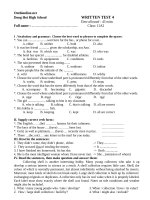ĐỀ KIỂM TRA 45 PHÚT TIẾNG ANH 11 có đáp án (TIENGANH123)
Bạn đang xem bản rút gọn của tài liệu. Xem và tải ngay bản đầy đủ của tài liệu tại đây (493.32 KB, 114 trang )
SỐ 1
I. Choose the word which is stressed differently from the others (0,6
points).
1.
A. celebrate
B. decorate
C. represent
D. savory
2.
A. secret
B. desire
C. manner
D. bluntness
3.
A. experience
B. embarrass
C. floppy
D. embrace
II. Choose the word whose underlined part is pronounced differently
from that of the other words. (0,4 points)
1.
A. honor
B. hover
C. home
D. happy
2.
A. invite
B. confirm
C. distribute
D. interact
III. Choose the best answer. (4 points)
1.
Vietnamese people do not eat with _________. We use spoons and
__________.
A. cutlery/ chopsticks
B. napkin/ sticks
C. plate/ teaspoon
D. etiquette/ dish
2.
Remove the teaspoon ___________ the cup before drinking.
A. to
B. from
C. back
D. out
3.
I always hear you ______ with your sister. What’s wrong between you?
A. argue
B. to argue
C. argued
D. argues
4.
Try _______ so many mistakes.
A. not to make
B. not make
C. to make not
D. make not
5.
There are some similarities in table __________ of different cultures in
the world.
A. ways
B. etiquette
C. styles
D. manners
6.
You had better _______ home and have a rest.
A. going
B. goes
C. to go
D. go
7.
A person or thing that is loved and admired very much is the____.
A. ideal
B. idea
C. idol
D. fan
8.
A short part of a film or movie that is shown separately is called a
______.
A. picture
B. clip
C. news
D. cartoon
9.
She _______ shyly at him and then lowered her eyes.
A. looked
B. stared
C. glanced
D. sighted
10.
This _______ girl was disliked by the rest of the class.
A. helpful
B. sneaky
C. unselfish
D. generous
11.
He pulled a(n) _______ of £10 notes out of his pocket.
A. sum
B. amount
C. piece
D. wad
12.
I’ve never fallen in such a(n) ______ situation before.
A. embarrassed
B. embarrassing
C. confused
D. confusing
13.
When I _______ home, I ______ a phone call.
A. got/ received
B. got/ had received
C. was getting/ was receiving
D. had got/ had received
14.
They _______ small cups of coffee after they _______ dinner.
A. had drunk/ finished
B. were drinking/ finished
C. drank/ finished
D. drank/ had finished
15.
It was midnight. Outside it ______ very hard.
A. rains
B. rained
C. had rained
D. was raining
16.
When he _______ at the station, his train already _______.
A. arrived/ left
B. had arrived/ left
C. arrived/ had left
D. had arrived/ left
17.
We always admire the________between Karl Marx and Frederic Engels.
A. difference
B. friendship
C. harmony
D. contribution
18.
There must be__________trust between friends.
A. shared
B. common
C. mutual
D. perfect
19.
Constancy is the second___________for a true friendship.
A. character
B. claim
C. demand
D. quality
20.
Her parents want her________a doctor.
A. become
B. to become
C. becoming
D. became
IV. Choose the part that is incorrect. (1 point)
1.
I spent (A) most of time (B) in the train read (C) my favorite book (D).
A
B
C
D
2.
I heard (A) him talked (B) about(C) you this morning (D).
A
B
C
D
3.
By the time (A) he is twenty-five (B), he had written (C) 20 books (D).
A
B
C
D
4.
I break (A) a glass when (B) I was washing (C) the glasses (D)
yesterday.
A
B
C
D
5.
She enjoys (A) to be (B) invited (C) to Minh's (D) birthday party.
A
B
C
D
V. Read the passage and choose the best answer to each question.
(1,5 points)
Having a best friend to confide in can bring a positive effect on our emotional
health. An evening out with the closest friend may be the best guarantee of a
good time. In fact, our best friend can prevent us from developing serious
psychological problems such as depression and anxiety.
Best friendship evolves with time - we cannot go out and pick our best friend.
We become friends with people who share common interests – at school or
through hobbies, for example.
Best friends have usually known each other for years and stuck together
through good and bad times. If you haven't got one, perhaps you are being too
distant from people, or focusing too much on your work.
1.
A best friend can ________.
A. give us a healthy life
B. go out with us in the evening
C. spend much time finding
D. share joy and sadness with us
2.
Close friends need to ________.
A. study at the same school
B. have the same interests
C. pursue the same hobbies
D. spend time together
3.
According to the passage, ________.
A. it takes a lot of time to make close friendships
B. we can go out and choose a good friend easily
C. best friends have good and bad times
D. It’s very difficult to make lasting friendships
4.
The word 'one' in the last paragraph refers to ________.
A. good time
B. bad time
C. a friendship
D. a close friend
5.
According to the passage, a best friend can help you with _______.
A. doing homework
B. doing housework
C. overcoming difficulties
D. overcoming depression and anxiety
VI. Write the sentence, using the given cues. (2,5 points)
1.
She/ not stand/ kept/ wait/ such/ long time//
=>
2.
She/ decide/ go back/ shop/ buy/ long dress//
=>
3.
It/ worth/ try/ make/ change/ her mind//
=>
4.
While / I / open / letter / telephone / ring
=>
5.
selfish person / incapable / true friendship
I. Choose the word which is stressed differently from the others (0,6
points).
1.
A. celebrate
B. decorate
C. represent
D. savory
- Trọng âm của từ "represent" rơi vào âm tiết thứ 3. Trọng âm của các từ còn
lại rơi vào âm tiết thứ nhất.
2.
A. secret
B. desire
C. manner
D. bluntness
- Trọng âm của từ "desire" rơi vào âm tiết thứ hai. Trọng âm của các từ còn lại
rơi vào âm tiết đầu tiên.
3.
A. experience
B. embarrass
C. floppy
D. embrace
- Trọng âm của từ "floppy" rơi vào âm tiết đầu tiên. Trọng âm của các từ còn lại
rơi vào âm tiết thứ hai.
II. Choose the word whose underlined part is pronounced differently
from that of the other words. (0,4 points)
1.
A. honor
B. hover
C. home
D. happy
- "h" trong "honor" câm. "h" trong các đáp án còn lại được phát âm là /h/.
2.
A. invite
B. confirm
C. distribute
D. interact
- "i" trong từ "confirm" được phát âm là /ɜ:/. Còn "i" trong các từ còn lại được
phát âm là /ɪ/.
III. Choose the best answer. (4 points)
1.
Vietnamese people do not eat with _________. We use spoons and
__________.
A. cutlery/ chopsticks
B. napkin/ sticks
C. plate/ teaspoon
D. etiquette/ dish
- Dựa vào nội dung của câu văn thì A là đáp án đúng.
- Câu này dịch là : Người Việt Nam không ăn bằng dao. Chúng tôi dùng thìa và
đũa.
2.
Remove the teaspoon ___________ the cup before drinking.
A. to
B. from
C. back
D. out
- Động từ "remove" được theo sau bởi giới từ "from" có nghĩa là bỏ/ di chuyển
thứ gì khỏi đâu đó.
- Câu này dịch là : Hãy bỏ chiếc thìa ra khỏi cốc trước khi uống.
3.
I always hear you ______ with your sister. What’s wrong between you?
A. argue
B. to argue
C. argued
D. argues
- Ta có cấu trúc với động từ "hear" như sau:
+ hear somebody doing something: nghe thấy ai đó đang làm gì.
+ hear somebody do something: nghe thấy ai đó đã làm gì.
=> A là đáp án đúng. Câu này dịch là: Tôi thường nghe thấy bạn cãi nhau với
chị gái bạn. Có chuyện gì với hai người vậy?
4.
Try _______ so many mistakes.
A. not to make
B. not make
C. to make not
D. make not
- Cấu trúc "try to do something" có nghĩa là cố gắng làm gì. Cấu trúc phủ
định là "try not to do something".
5.
There are some similarities in table __________ of different cultures in
the world.
A. ways
B. etiquette
C. styles
D. manners
- Ta có cụm danh từ "table manners" có nghĩa là phép tắc ăn uống (cách cư
xử trong bữa ăn khi ăn với người khác)
6.
You had better _______ home and have a rest.
A. going
B. goes
C. to go
D. go
- Cấu trúc "had better + V (nguyên thể)" có nghĩa là nên làm gì.
7.
A person or thing that is loved and admired very much is the____.
A. ideal
B. idea
C. idol
D. fan
- ideal (n) : lý tưởng
- idea (n) : ý kiến
- idol (n) : thần tượng
- fan (n) : người hâm mộ
=> Đáp án đúng là C. Câu này dịch là : Một người hay một vật được yêu thích
và được ngưỡng mộ rất nhiều được gọi là thần tượng.
8.
A short part of a film or movie that is shown separately is called a
______.
A. picture
B. clip
C. news
D. cartoon
- picture (n) : tranh, ảnh
- clip (n) : đoạn phim
- news (n) : tin tức
- cartoon (n) : phim hoạt hình
=> Đáp án đúng là B. Câu này được dịch là: Một phần của một bộ phim được
chiếu riêng biệt được gọi là "clip".
9.
She _______ shyly at him and then lowered her eyes.
A. looked
B. stared
C. glanced
D. sighted
- look at : nhìn vào
- stare at : nhìn chằm chằm
- glance at : liếc qua, liếc nhanh
- sight: tìm thấy, bất ngờ nhìn thấy. Động từ này không đi cùng với giới từ 'at".
=> C là đáp án đúng. Câu này dịch là: Cô ấy liếc nhìn anh ấy một cách thẹn
thùng và sau đó nhìn xuống.
10.
This _______ girl was disliked by the rest of the class.
A. helpful
B. sneaky
C. unselfish
D. generous
- helpful (adj) : hay giúp đỡ người khác
- sneaky (adj) : vụng trộm, lén lút (hành vi)
- unselfish (adj) : không ích kỷ
- generous (adj) : rộng lượng, hào phóng
=> Chỗ trống cần điền một tính từ mang nghĩa tiêu cực. => B là đáp án đúng.
11.
He pulled a(n) _______ of £10 notes out of his pocket.
A. sum
B. amount
C. piece
D. wad
- "a wad of £10 notes: một cọc tiền 10 bảng"
12.
I’ve never fallen in such a(n) ______ situation before.
A. embarrassed
B. embarrassing
C. confused
D. confusing
- Vì danh từ theo sau là "situation" chỉ sự việc nên loại đáp án A và C.
- embarrassing (adj) : ngượng ngùng,
- confusing (adj) : khó hiểu, gây bối rối
=> Chúng ta dùng "embarrassing" khi thứ gì đó làm ta có cảm giác ngượng
ngùng, xấu hổ hay cảm thấy mình ngu ngốc trước mặt người khác. Còn
"confusing" mang nghĩa là làm cho người khác lúng túng, khó hiểu.
=> B là đáp án đúng. Chúng ta thường dùng "embarrassing" với "situation".
13.
When I _______ home, I ______ a phone call.
A. got/ received
B. got/ had received
C. was getting/ was receiving
D. had got/ had received
- Trong câu này diễn tả hai hành động xảy ra liên tiếp nhau trong quá khứ: Khi
tôi về đến nhà, tôi nhận được một cuộc điện thoại.. Do đó ta chỉ đơn thuần chia
cả 2 động từ ở quá khứ đơn.
14.
They _______ small cups of coffee after they _______ dinner.
A. had drunk/ finished
B. were drinking/ finished
C. drank/ finished
D. drank/ had finished
- Câu này diễn tả một việc xảy ra trước, một việc xảy ra sau trong quá khứ =>
Việc xảy ra trước (ăn tối xong) sẽ chia ở quá khứ hoàn thành, còn việc xảy ra
sau (uống cà phê) sẽ chia ở quá khứ đơn.
15.
It was midnight. Outside it ______ very hard.
A. rains
B. rained
C. had rained
D. was raining
- Ta dùng thì quá khứ tiếp diễn để diễn tả hành động đang xảy ra tại một thời
điểm xác định trong quá khứ.
16.
When he _______ at the station, his train already _______.
A. arrived/ left
B. had arrived/ left
C. arrived/ had left
D. had arrived/ left
- Câu này diễn tả một hành động xảy ra trước và một hành động xảy ra sau
trong quá khứ. Dó đó ta chia thì quá khứ đơn với hành động xảy ra sau là đến
nhà ga, và chia thì quá khứ hoàn thành cho hành động xảy ra trước là chuyến
tàu đã rời đi.
17.
We always admire the________between Karl Marx and Frederic Engels.
A. difference
B. friendship
C. harmony
D. contribution
- difference (n) : sự khác biệt
- friendship (n) : tình bạn, tình hữu nghị
- harmony (n) : sự hài hòa, cân đối, hòa thuận
- contribution (n) : sự đóng góp
=>B là đáp án đúng.
18.
There must be__________trust between friends.
A. shared
B. common
C. mutual
D. perfect
- shared (adj): sự chia sẻ
- common (adj) : chung
- mutual (adj) : lẫn nhau
- perfect (adj) : hoàn hảo
=> C là đáp án đúng. Câu này dịch là: Cần phải có sự tin tưởng lẫn nhau giữa
những người bạn.
19.
Constancy is the second___________for a true friendship.
A. character
B. claim
C. demand
D. quality
- character (n) : tính cách, đặc điểm
- claim (n) : tuyên bố
- demand (n) : yêu cầu
- quality (n) : phẩm chất
=> D là đáp án đúng.
20.
Her parents want her________a doctor.
A. become
B. to become
C. becoming
D. became
- Cấu trúc "want somebody to do something" muốn ai đó làm gì.
IV. Choose the part that is incorrect. (1 point)
1.
I spent (A) most of time (B) in the train read (C) my favorite book (D).
A
B
C
D
- Cấu trúc "spend + time + V-ing" có nghĩa là dành thời gian làm gì.
- Sửa "read" => "reading"
2.
I heard (A) him talked (B) about(C) you this morning (D).
A
B
C
D
- Có 2 cấu trúc với "hear":
"hear somebody do something" có nghĩa là nghe thấy/ thấy ai đã làm gì.
"hear somebody doing something": nghe thấy ai đó đang làm gì
Do đó không thể để là "talked" được.
3.
By the time (A) he is twenty-five (B), he had written (C) 20 books (D).
A
B
C
D
- Khi trong câu có cụm từ "by the time" (tính đến lúc) thì mệnh đề chính trong
câu thường chia ở thì hoàn thành. Động từ to be "is" trong mệnh đề chỉ thời
gian được chia ở hiện tại đơn, như vậy mốc thời gian ở đây là một thời điểm
trong tương lai => Động từ ở vế sau không thể chia ở quá khứ hoàn thành mà
là tương lai hoàn thành "will have written".
4.
I break (A) a glass when (B) I was washing (C) the glasses (D)
yesterday.
A
B
C
D
- Câu trên diễn tả một việc đang xảy ra thì một việc khác xen vào ở quá khứ.
=> Hành động xen vào chia ở quá khứ đơn nên động từ "break" phải được chia
là "broke".
5.
She enjoys (A) to be (B) invited (C) to Minh's (D) birthday party.
A
B
C
D
- Động từ sau động từ "enjoy" được chia ở dạng "V-ing"
=> Sửa "to be" thành "being"
V. Read the passage and choose the best answer to each question.
(1,5 points)
Having a best friend to confide in can bring a positive effect on our emotional
health. An evening out with the closest friend may be the best guarantee of a
good time. In fact, our best friend can prevent us from developing serious
psychological problems such as depression and anxiety.
Best friendship evolves with time - we cannot go out and pick our best friend.
We become friends with people who share common interests – at school or
through hobbies, for example.
Best friends have usually known each other for years and stuck together
through good and bad times. If you haven't got one, perhaps you are being too
distant from people, or focusing too much on your work.
1.
A best friend can ________.
A. give us a healthy life
B. go out with us in the evening
C. spend much time finding
D. share joy and sadness with us
- Dựa vào nội dung của cả bài và câu đầu tiên của đoạn thứ 3 "Best friends
have usually known each other for years and stuck together through good and
bad times".
=> D là đáp án đúng.
2.
Close friends need to ________.
A. study at the same school
B. have the same interests
C. pursue the same hobbies
D. spend time together
- Dựa vào nội dung của câu văn "We become friends with people who share
common interests... "
3.
According to the passage, ________.
A. it takes a lot of time to make close friendships
B. we can go out and choose a good friend easily
C. best friends have good and bad times
D. It’s very difficult to make lasting friendships
- Dựa vào nội dung của câu đầu tiên đoạn 3, "Best friends have usually known
each other for years..."
4.
The word 'one' in the last paragraph refers to ________.
A. good time
B. bad time
C. a friendship
D. a close friend
- Dựa vào nội dung câu văn trước câu chứa đại từ "one" thì D là đáp án đúng.
Câu này đang nói đến việc nếu bạn không có một người bạn thân thì có thể là
bạn quá xa cách với mọi người.
5.
According to the passage, a best friend can help you with _______.
A. doing homework
B. doing housework
C. overcoming difficulties
D. overcoming depression and anxiety
- Dựa vào nội dung câu cuối cùng của đoạn đầu "In fact, our best friend can
prevent us from developing serious psychological problems such as depression
and anxiety."
VI. Write the sentence, using the given cues. (2,5 points)
1.
She/ not stand/ kept/ wait/ such/ long time//
=>
She cannot stand being kept waiting such a long time.|She can't stand being
kept waiting such a long time.|She cannot stand being kept waiting for such a
long time.|She can't stand being kept waiting for such a long time.
2.
She/ decide/ go back/ shop/ buy/ long dress//
=>
She decided to go back to the shop to buy the long dress.
3.
It/ worth/ try/ make/ change/ her mind//
=>
It's worth trying to make her change her mind.|It is worth trying to make her
change her mind.
4.
While / I / open / letter / telephone / ring
=>
While I was opening the letter the telephone rang.
5.
selfish person / incapable / true friendship
=>
A selfish person is incapable of true friendship.|A selfish person is incapable of
having a true friendship.
SỐ 2
I. Choose the word which is stressed differently from the others (0,6
points)
1.
A. enthusiasm
B. interest
C. capable
D. sympathy
2.
A. candle
B. embrace
C. sneaky
D. finish
3.
A. celebrate
B. together
C. family
D. special
II. Choose the word whose underlined part is pronounced differently
from that of the other words. (0,4 points)
1.
A. jam
B. dangerous
C. village
D. glance
2.
A. machine
B. church
C. question
D. children
III. Choose the best answer. (4 points)
1.
My friend often shows her ___________ whenever I have troubles.
A. sympathy
B. sympathize
C. sympathetic
D. sympathetically
2.
He doesn’t know much about the project but he is very ____________.
A. enthusiastic
B. enthusiast
C. enthusiasm
D. enthusiastically
3.
Daisy is so ___________. She only cares about herself, not about other
people.
A. helpful
B. selfish
C. loyal
D. talkative
4.
She is not determined and often changes her ideas. What a/an
_____________ girl she is.
A. uncertain
B. mutual
C. suspicious
D. changeable
5.
_________ is the quality of being faithful and loyal to a particular person
or belief.
A. Acquaintance
B. Constancy
C. Sympathy
D. Sorrow
6.
On Christmas Day, people exchange presents with each other and say
‘_________Christmas’.
A. Happy
B. Merry
C. Exciting
D. Nice
7.
Choose the word that has the same meaning as the underlined word.
Children often receive presents from their parents at Christmas.
A. candles
B. candy
C. cards
D. gifts
8.
The girls agreed________the cake equally.
A. to be divided
B. to divide
C. dividing
D. divide
9.
I hope__________to university next year.
A. to go
B. go
C. going
D. went
10.
I expected ________to the party, but I was not.
A. to invite
B. inviting
C. to be invited
D. being invited
11.
Could I have something non-alcoholic, like__________, please?
A. vodka
B. whisky
C. orange juice
D. beer
12.
The new students hoped to be included _____ many of the school’s
social activities.
A. in
B. at
C. about
D. on
13.
Wedding anniversaries mark the _____ of a happy and lasting
relationship between married couples.
A. labels
B. starting points
C. symptoms
D. milestones
14.
She complains _____ about anything she doesn’t like. She is the type of
person who is always making a fuss.
A. noise
B. noisy
C. noisily
D. noises
15.
When we __________ to see him last night, he ________ to music.
A. come / is listening
B. had come / listened
C. came / was listening
D. were coming / had listened
16.
Most ______ couples in the United States celebrate wedding
anniversaries each year.
A. marry
B. marrying
C. marriage
D. married
17.
I don’t like that boy because there’s a _____ look on his face.
A. careful
B. illegal
C. sneaky
D. happy
18.
Jack got into trouble when he refused ________ his briefcase for the
custom officer.
A. opening
B. being opened
C. to open
D. to be opened
19.
We can’t count on ________ by our parents every time we get into
difficulty.
A. to rescue
B. to be rescued
C. rescuing
D. being rescued
20.
When I ________ home, I ________ a phone call.
A. was getting/ was receiving
B. had got/ had received
C. got/ received
D. got/ had received
IV. Choose the part that is incorrect. (1 point)
1.
Lan was (A) in a difficult situation (B), so I agreed lending (C) her (D)
some money.
A
B
C
D
2.
He seldom travels (A) by bicycle (B) before (C) he went (D) to
Vietnam.
A
B
C
D
3.
I used to eating (A) ice cream when (B) I was (C) a child (D).
A
B
C
D
4.
After he received (A) my postcard (B), he phoned (C)
me immediately(D).
A
B
C
D
5.
Could (A) you please stop (B) to make (C) so much noise (D)?
A
B
C
D
V. Read the passage and choose the best answer to each question.
(1,5 points)
MARIA’S HOMECOMING
When the bus ________ (1) in a small square, Maria was reading her magazine
and didn’t realize that she had arrived at her destination. “This is Santa
Teresa,” Martin said. “You’ve arrived home!” I suppose your cousin will be
________ (2) for us. Come on. I’ll carry the bags.” Maria thought, “All those
years when I ________ (3) in New York, I used to dream of this moment. And
now it’s real, I can’t believe it! Here I am, I’m really standing in the square.”
Santa Teresa was Maria’s birthplace, but she often left the town at the age of
six. She had some ________ (4) of the town, and some photos, but did she
belong here still? She didn’t know. Nobody was waiting in the square. Perhaps
her cousin Pablo hadn’t received Maria’s letter. “What are we going to do
now?” asked Martin. “There isn’t ________ (5) a hotel here!”
1.
A. reached
B. got
C. stopped
D. came
2.
A. expecting
B. waiting
C. welcoming
D. receiving
3.
A. was living
B. have lived
C. live
D. am living
4.
A. recall
B. memories
C. thinking
D. remembering
5.
A. even
B. hardly
C. too
D. very
VI. Arrange these words or groups of words in the correct order. (2,5
points)
1.
to/ play/ five/ He/ piano/ started/ the/ years/ ago
=>
2.
letter/ the/ ,/ opening/ the/ was/ telephone/ I/ rang/ While
=>
3.
been/ We/ for/ two/ hours/ for/ have/ waiting/ you
=>
4.
window/ Tommy/ to/ throwing/ admitted/ the/ through/ rock/ the
=>
5.
Jack/ at/ me/ Whenever/ avoided/,/ met/ we/ looking
______________________________________________________________
. Choose the word which is stressed differently from the others (0,6
points)
1.
A. enthusiasm
B. interest
C. capable
D. sympathy
- Trọng âm của từ "enthusiasm" rơi vào âm tiết thứ 2. Trọng âm của các từ còn
lại rơi vào âm tiết thứ nhất.
2.
A. candle
B. embrace
C. sneaky
D. finish
- Trọng âm của từ "embrace" rơi vào âm tiết thứ hai. Trọng âm của các từ còn
lại rơi vào âm tiết đầu tiên.
3.
A. celebrate
B. together
C. family
D. special
- Trọng âm của từ "together" rơi vào âm tiết thứ hai. Trọng âm của các từ còn
lại rơi vào âm tiết đầu tiên.
II. Choose the word whose underlined part is pronounced differently
from that of the other words. (0,4 points)
1.
A. jam
B. dangerous
C. village
D. glance
- "g" trong "glance"được phát âm là /g/. "g" trong các đáp án còn lại được phát
âm là /dʒ/.
2.
A. machine
B. church
C. question
D. children
- "ch" trong từ "machine" được phát âm là / ʃ /. Còn "ch" và "t" trong các từ còn
lại được phát âm là /tʃ /.
III. Choose the best answer. (4 points)
1.
My friend often shows her ___________ whenever I have troubles.
A. sympathy
B. sympathize
C. sympathetic
D. sympathetically
- Đứng trước chỗ trống là tính từ sở hữu "her" được dùng để bổ nghĩa cho danh
từ=> Chỗ trống cần điền một danh từ.
=> A là đáp án đúng.
2.
He doesn’t know much about the project but he is very ____________.
A. enthusiastic
B. enthusiast
C. enthusiasm
D. enthusiastically
- Chỗ trống cần điền từ loại tính từ vì đứng sau động từ "to be" => A là đáp án
đúng.
3.
Daisy is so ___________. She only cares about herself, not about other
people.
A. helpful
B. selfish
C. loyal
D. talkative
- helpful (adj) : giúp đỡ, có ích, giúp ích.
- sefish (adj) : ích kỷ
- loyal (adj) : trung thành
- talkative (adj) : hay nói, thích nói, ba hoa
=> B là đáp án đúng. Câu này được dịch là : Daisy rất ích kỷ. Cô ấy chỉ quan
tâm đến chính mình, không quan tâm đến người khác.
4.
She is not determined and often changes her ideas. What a/an
_____________ girl she is.
A. uncertain
B. mutual
C. suspicious
D. changeable
- uncertain (adj) : không chắc chắn
- mutual (adj) : lẫn nhau
- suspicious (adj) : hay nghi ngờ, đa nghi
- changeable (adj) : hay thay đổi, dễ thay đổi
=> D là đáp án đúng. Câu này dịch là : Cô ấy không quyết đoán và thường
thay đổi ý kiến. Một cô gái dễ thay đổi làm sao!
5.
_________ is the quality of being faithful and loyal to a particular person
or belief.
A. Acquaintance
B. Constancy
C. Sympathy
D. Sorrow
- Aquaintance (n) : người quen
- Constancy (n) : sự kiên định
- Sympathy (n) : sự cảm thông
- Sorrow (n) : sự đau khổ, buồn phiền
=>B là đáp án đúng. Câu này được dịch là : Sự kiên định là phẩm chất của
lòng trung thực và trung thành với một người hay một lý tưởng.
6.
On Christmas Day, people exchange presents with each other and say
‘_________Christmas’.
A. Happy
B. Merry
C. Exciting
D. Nice
- Ta có cụm từ "Merry Christmas" có nghĩa là Chúc mừng giáng sinh.
7.
Choose the word that has the same meaning as the underlined word.
Children often receive presents from their parents at Christmas.
A. candles
B. candy
C. cards
D. gifts
- present (n) : món quà
- candle (n) : nến, đèn cầy
- candy (n) : kẹo
- card (n) : thiệp
- gift (n) : món quà
=> Đáp án đúng là D.
8.
The girls agreed________the cake equally.
A. to be divided
B. to divide
C. dividing
D. divide
- Ta có cấu trúc "agree to do something" có nghĩa là đồng ý làm gì.
9.
I hope__________to university next year.
A. to go
B. go
C. going
D. went
- Cấu trúc "hope to do something" có nghĩa là hi vọng điều gì/ làm gì.
10.
I expected ________to the party, but I was not.
A. to invite
B. inviting
C. to be invited
D. being invited
- Cấu trúc "expect to do something" có nghĩa là mong chờ làm gì => Lựa
chọn B và D bị loại.
- Trong câu mang nghĩa bị động => C là đáp án đúng.
- Câu này dịch là : Tôi đã mong được mời đến bữa tiệc nhưng tôi đã không được
mời.
11.
Could I have something non-alcoholic, like__________, please?
A. vodka
B. whisky
C. orange juice
D. beer
- vodka (n) : rượu vốt ca
- whisky (n) : rượu uých ky
- orange juice (n) : nước cam
- beer (n) : bia
=> C là đáp án đúng. Câu này dịch là: Tôi có thể uống thứ gì đó không có cồn
được không, như là nước cam chẳng hạn?
12.
The new students hoped to be included _____ many of the school’s
social activities.
A. in
B. at
C. about
D. on
- Cấu trúc "include in something" có nghĩa là tham gia vào cái gì.
13.
Wedding anniversaries mark the _____ of a happy and lasting
relationship between married couples.
A. labels
B. starting points
C. symptoms
D. milestones
- labels (n) : nhãn hiệu
- starting points (n) : điểm xuất phát
- symptoms (n) : triệu chứng
- milestones (n) : giai đoạn quan trọng (trong đời ai)
=> D là đáp án đúng. Câu này dịch là : Kỷ niệm ngày cưới đánh dấu giai đoạn
quan trọng của một mối quan hệ hạnh phúc và lâu dài giữa các cặp vợ chồng.
14.
She complains _____ about anything she doesn’t like. She is the type of
person who is always making a fuss.
A. noise
B. noisy
C. noisily
D. noises
- Đứng sau động từ là một trạng từ để bổ nghĩa cho động từ => C là đáp án
đúng.
15.
When we __________ to see him last night, he ________ to music.
A. come / is listening
B. had come / listened
C. came / was listening
D. were coming / had listened
- Câu trên diễn tả một hành động đang xảy ra (nghe nhạc) thì một hành động
khác xen vào (đến gặp). Do đó, ta dùng thì quá khứ tiếp diễn để diễn tả hành
động đang xảy ra và dùng thì quá khứ đơn để diễn tả hành động xen vào.
16.
Most ______ couples in the United States celebrate wedding
anniversaries each year.
A. marry
B. marrying
C. marriage
D. married
- Dùng một tính từ đứng trước một danh từ để bổ nghĩa cho danh từ đó.
=> D là đáp án đúng.
17.
I don’t like that boy because there’s a _____ look on his face.
A. careful
B. illegal
C. sneaky
D. happy
- careful (adj) : cẩn thận
- illegal (adj) : bất hợp pháp
- sneaky (adj) : vụng trộm, lén lút
- happy (adj) : hạnh phúc
=> C là đáp án đúng. Câu này được dịch là : Tôi không thích cậu bé đó bởi vì
có vẻ lén lút trên mặt cậu ta.
18.
Jack got into trouble when he refused ________ his briefcase for the
custom officer.
A. opening
B. being opened
C. to open
D. to be opened
- Ta có cấu trúc "refuse to do something" có nghĩa là từ chối làm gì.
=> Câu này dùng ở dạng chủ động nên đáp án đúng là C.
19.
We can’t count on ________ by our parents every time we get into
difficulty.
A. to rescue
B. to be rescued
C. rescuing
D. being rescued
- Cấu trúc "count on something/ doing something" có nghĩa là trông đợi/
trông mong vào việc gì.
=> Nghĩa của câu mang nghĩa bị động nên đáp án đúng là D.
20.
When I ________ home, I ________ a phone call.
A. was getting/ was receiving
B. had got/ had received
C. got/ received
D. got/ had received
- Nội dung của câu trên diễn tả hai hành động xảy ra liên tiếp nhau ở quá khứ
=> C là đáp án đúng. Câu này dịch là : Khi tôi về nhà, tôi nhận được một cuộc
điện thoại.
IV. Choose the part that is incorrect. (1 point)
1.
Lan was (A) in a difficult situation (B), so I agreed lending (C) her (D)
some money.
A
B
C
D
- Cấu trúc "agree to do something " có nghĩa là đồng ý làm gì .
- Sửa "lending" => "to lend "
2.
He seldom travels (A) by bicycle (B) before (C) he went (D) to
Vietnam.
A
B
C
D
- Nội dung của câu diễn tả một hành động xảy ra trước và một hành động xảy
ra sau ở quá khứ nên hành động xảy ra trước (travel) phải được chia ở quá khứ
hoàn thành.
- Sửa "travels" thành "had traveled ".
3.
I used to eating (A) ice cream when (B) I was (C) a child (D).
A
B
C
D
- Cấu trúc với "used to + V (nguyên thể) " diễn tả một việc thường xảy ra ở
quá khứ và đã kết thúc ở hiện tại.
=> Sửa "eating" thành "eat".
4.
After he received (A) my postcard (B), he phoned (C)
me immediately(D).
A
B
C
D
- Nội dung của câu diễn tả một hành động xảy ra trước và một hành động xảy
ra sau ở quá khứ.
=>Hành động xảy ra trước (receive) phải được chia ở quá khứ hoàn thành. Sửa
"received => "had received".
5.
Could (A) you please stop (B) to make (C) so much noise (D)?
A
B
C
D
- Động từ sau động từ "stop" được chia ở dạng "V-ing"
=> Sửa "to make " thành "making"
V. Read the passage and choose the best answer to each question.
(1,5 points)
MARIA’S HOMECOMING
When the bus ________ (1) in a small square, Maria was reading her magazine
and didn’t realize that she had arrived at her destination. “This is Santa
Teresa,” Martin said. “You’ve arrived home!” I suppose your cousin will be
________ (2) for us. Come on. I’ll carry the bags.” Maria thought, “All those
years when I ________ (3) in New York, I used to dream of this moment. And
now it’s real, I can’t believe it! Here I am, I’m really standing in the square.”
Santa Teresa was Maria’s birthplace, but she often left the town at the age of
six. She had some ________ (4) of the town, and some photos, but did she
belong here still? She didn’t know. Nobody was waiting in the square. Perhaps
her cousin Pablo hadn’t received Maria’s letter. “What are we going to do
now?” asked Martin. “There isn’t ________ (5) a hotel here!”
1.
A. reached
B. got
C. stopped
D. came
- Cấu trúc "reach something" có nghĩa là đến đâu đó
- "get something" có nghĩa là đến nơi nào đó
- "stop"(v) : dừng lại, ngừng lại
- "come to" có nghĩa là đến đâu đó
=> Do đó C là đáp án đúng.
2.
A. expecting
B. waiting
C. welcoming
D. receiving
- Cấu trúc "wait for" có nghĩa là đợi/ chờ đợi.
3.
A. was living
B. have lived
C. live
D. am living
- Vế sau của câu chia ở thì quá khứ , do đó động từ vế trước cũng phải được
chia ở thì quá khứ => A là đáp án đúng.
4.
A. recall
B. memories
C. thinking
D. remembering
- recall (n) : sự gợi về, sự nhắc nhở
- memories (n) : kỷ niệm, ký ức
- thingking (gerund) : suy nghĩ
- remembering (gerund) :sự nhớ
=> B là đáp án đúng.
5.
A. even
B. hardly
C. too
D. very
- hardly (adv) : hầu như không
- too (adv) : quá
- very (adv) : rất
- Để nhấn mạnh cho danh từ phía sau, ta dùng trạng từ "even" có nghĩa
là thậm chí.
VI. Arrange these words or groups of words in the correct order. (2,5
points)
1.
to/ play/ five/ He/ piano/ started/ the/ years/ ago
=>
He started to play the piano five years ago.
2.
letter/ the/ ,/ opening/ the/ was/ telephone/ I/ rang/ While
=>
While I was opening the letter, the telephone rang.
3.
been/ We/ for/ two/ hours/ for/ have/ waiting/ you
=>
We have been waiting for you for two hours.
4.
window/ Tommy/ to/ throwing/ admitted/ the/ through/ rock/ the
=>
Tommy admitted to throwing the rock through the window.
5.
Jack/ at/ me/ Whenever/ avoided/,/ met/ we/ looking
=>
Whenever we met, Jack avoided looking at me
SỐ 3
I. Choose the word which is stressed differently from the others (0.6
points)
1.
A. generous
B. suspicious
C. constancy
D. sympathy
2.
A. relationship
B. sympathy
C. incapable
D. experience
3.
A. intelligent
B. interesting
C. hospitable
D. favourite
II. Choose the word whose underlined part is pronounced differently
from that of the other words. (0.4 points)
1.
A. looked
B. finished
C. turned
D. helped
2.
A. children
B. divorce

